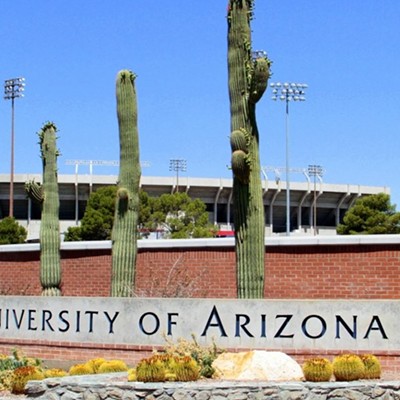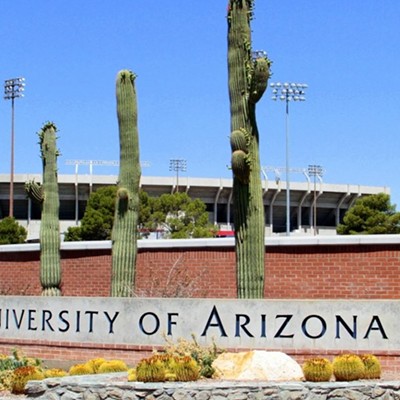There are imminent budget cuts, once again, coming to the University of Arizona.
If this trend follows the same pattern it's laid out since 2007, another tuition and fees hike may hit some students in the face, although the head of the Arizona Board of Regents, which oversees the three public universities, has said ABOR and the institutions will work hard so that the shortfalls don't end up on the shoulders of families and students. But while undergrads and graduates prepare for what these cuts could mean to their academic and personal lives, expect them to make a lot of noise.
Before news broke of Gov. Doug Ducey's proposal to cut more than $75 million from state universities and increase what's given to private prisons, working graduate students hoped for a pay raise, less attendance fees and making other employee demands a reality. Now, as about $22 million of that cut is coming out of the UA, they are in crisis mode. For many, such as Ph.D. anthropology student Cari Tusing, the goal is to keep what they have: semi-livable job wages with a tuition incentive.
In her sixth semester at the UA, Tusing has mastered the art of simplifying her expenses to stretch the wage she earns with her three jobs on campus. For instance, she's a member of Tucson Community Supported Agriculture, where she can get fresh produce to eat for the cost of $10 a week. Thankfully, her teacher and research assistant gigs cover tuition, which spared her scavenging for thousands of dollars without the burden of acquiring more debt.
These two positions are crutches as Tusing struggles to stay afloat through her doctorate studies, which should be in their final stage in the next year or so. But because of the anticipated budget cuts, her jobs' lifespan is uncertain as her department may not be able to offer many graduate students labor opportunities after the UA shortfalls are absorbed.
"If I don't get funding, I am dropping out," says Tusing, who as a TA helps about 70 undergrads. Last year, she paid for school with a fellowship awarded by the federal government. "This university has a wide range of socio-economic backgrounds, and not everyone is going to feel these cuts the same way."
Part of the benefit of being a TA is you get tuition paid for, but their classroom responsibilities can be as grand as a professor whose salary is at times close to the six-digit margin: hundreds of students to teach every semester; papers and exams to grade; emails to answer after hours and on the weekends (on top of research and their own assignments). Yet, an average working graduate student makes about $16,000, which is below the estimated cost of attendance ($20,900, according to the UA Graduate Professional Student Council), as well as the living wage for Pima County ($17,400 as calculated by the Massachusetts Institute of Technology).
"One thing I love about teaching undergraduates is that it gives me the professionalization of my career, but at the same time I am able to identify with the students, so I don't want to say, 'Oh, I have done my 10 or 20 hours for the week, I am done,' I really want to provide them with a quality education," Tusing says. "The university needs to focus on empowering the people who are teaching these students, why not incentivize our work?"
In the absence of quality monetary support from the state, tuition and fees at the UA have increased by 188 percent in the past decade. (Last April, ABOR approved to freeze tuition for eight consecutive semesters but only for incoming freshmen.) To an extent, students understand this is one way to raise money. However, at the sight of yet another blow to the education fund, there is a general discomfort with the cuts' consequences always trickling down to students and the individual departments that have to continue tightening their belt—they'll recruit one or two graduate students less, and add more workload to the ones who were able to keep their jobs, all while the low salary remains stagnant.
This "cut from the bottom and never from the top" coping mechanism really bothers Tusing and her colleagues in the Social and Behavioral Sciences Organizing Committee, UA graduate students from various departments that advocate for better wages, affordable healthcare plans, administrative transparency, and on-site childcare, among other necessities.
Tusing and committee member Kate Freeman, a Ph.D. student in the Department of Gender and Women's Studies, say the cuts mostly happen on an academic level and rarely on student affairs or the middle-to-top-level administrative realms. While amenities for the students are key recruiting tools deserving of funds, a lot of money spent there, or in the form of hundreds of thousands of dollars for an administrator's salary, could be better focused on pedagogy: TAs, adjunct and others who foster the prime purpose of a university, providing students with quality higher education.
"We can tell you how you can meet your budget, you are going to slash these administrative positions that are literally stealing from us," Freeman says. She works with the LGBT Institute and is a former TA who took care of up to 90 undergrads. "These unnecessary layers of administrative oversight that we have. There is a certain number of people in between you and (UA President Ann Weaver Hart), who are not accessible to you as a paying consumer of this university."
Numbers crunched by the Service Employees International Union, which aims to improve the quality of academic jobs, show that merely 25 percent of the UA's budget expenditures goes toward instruction—the classroom, wages for TAs and adjuncts, etc. Graduate students, who sometimes end up paying thousands in fees on top of tuition—in Tusing's case, it's $1,000 a year from her pocket—are wondering exactly where that 75 percent is going to.
As people who directly fund the institution, they demand transparency, they say.
"With these budget cuts, you will see more of our cash going into the institution, so we should have more of a view into how that money is going to be spent," says Zach Brooks, president of the Graduate and Professional Student Council. For the past week, Brooks and other UA students have been traveling to the state Capitol to meet face-to-face with lawmakers who'll decide just how bad these cuts will be. "There are all these fees. The analogy I use is, for a long time, we played a game of whack-a-mole with these fees, you could actually keep up, 'Here's a fee, and there's another.' But now, we have to build an algorithm, this very sophisticated game, to figure out how many fees there are."
It is now in the hands of the Arizona Board of Regents to present the state Legislature with their budget proposal. After lawmakers approve a budget, the UA administration decides how the cuts will roll out within the institution.
Graduate students, and others at the frontline of classrooms, would like a seat at that table.
"We respect the way ABOR is set up with student regents, but we don't think that student regents have been effective in voicing our concerns," Tusing says. "We have one here at the UA, and, at least everyone I have talked to including undergraduates, have never been in contact with her. I'm not saying she isn't doing a good job, but there needs to be more representation, more voices to ensure that not just one or two students who are working on ABOR in a professional sense are the only ones advocating for students. They don't represent our movement."













